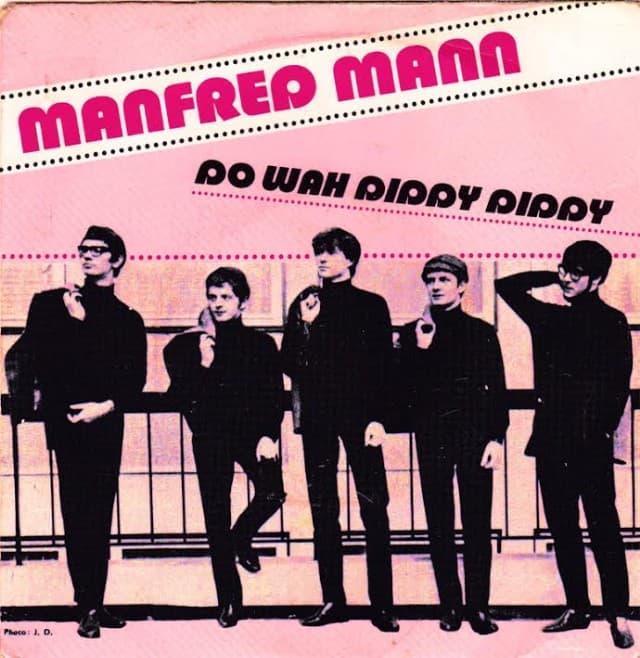
“Do Wah Diddy Diddy” – Manfred Mann’s Irresistible 1960s Pop Smash
“Do Wah Diddy Diddy,” released in 1964 by Manfred Mann, is one of the most enduring and infectious pop hits of the 1960s. Originally written by the songwriting duo Jeff Barry and Ellie Greenwich and recorded by The Exciters, it was Manfred Mann’s cover version that propelled the song to international stardom. With its upbeat rhythm, catchy chorus, and playful energy, the song skyrocketed to the No. 1 spot on the Billboard Hot 100 in the United States and dominated the UK Singles Chart, cementing its place as one of the decade’s quintessential feel-good anthems.
Manfred Mann, a British band initially rooted in jazz and rhythm and blues, had already begun making a name for themselves with tracks like “5-4-3-2-1.” However, “Do Wah Diddy Diddy” represented a shift toward a more accessible pop sound, a move that proved to be incredibly successful. The song perfectly captured the spirit of the mid-60s: lively, carefree, and bursting with youthful exuberance. In the wake of the British Invasion, bands like Manfred Mann embraced a playful, lighthearted approach to music that resonated deeply with audiences on both sides of the Atlantic.
Musically, “Do Wah Diddy Diddy” is deceptively simple yet masterfully crafted. The song features a brisk tempo driven by energetic drums, jangly guitar chords, and an infectious bassline that keeps the momentum flowing from start to finish. What truly makes the song unforgettable, though, is the call-and-response vocal arrangement. The back-and-forth between lead singer Paul Jones and the backing vocals gives the song a dynamic, conversational quality, drawing listeners in as if they’re part of the fun.
The nonsensical title phrase—**“Do Wah Diddy Diddy”—**adds to the song’s playful charm. Much like other pop hits of the era, such as “Da Doo Ron Ron” by The Crystals, the song leans into the use of catchy, rhythmic syllables to create an earworm effect. It’s a technique that had become a hallmark of 1960s pop, particularly among artists influenced by girl group sounds and the burgeoning Motown scene.
Lyrically, “Do Wah Diddy Diddy” tells a simple love story of instant attraction. The narrator sees a girl “walking down the street” and knows immediately that she’s the one for him. As the song progresses, the romance unfolds at lightning speed—from a casual meeting to love at first sight, and ultimately, marriage. It’s a story of idealized love, reflecting the optimistic worldview of the time, where happiness feels just around the corner. Lines like “She looked good, she looked fine, and I nearly lost my mind” convey the giddy excitement of falling in love, while the upbeat delivery reinforces the sense of joy and spontaneity.
“Do Wah Diddy Diddy” became one of the defining songs of the British Invasion, a cultural movement that introduced American audiences to a wave of British artists, forever changing the landscape of popular music. While bands like The Beatles and The Rolling Stones brought rock and blues to the forefront, Manfred Mann’s success with “Do Wah Diddy Diddy” highlighted the importance of pure pop in the era’s musical tapestry.
The song’s widespread appeal extended beyond its chart performance, securing a lasting place in popular culture. It has been featured in movies, television shows, and commercials, reinforcing its status as a timeless feel-good classic. The song’s infectious nature ensures that it continues to charm new generations of listeners, proving that its simple message of joy and romance is as relevant today as it was in 1964.
Manfred Mann would go on to explore more diverse musical directions in the years following “Do Wah Diddy Diddy,” experimenting with jazz, blues, and progressive rock. However, this song remains one of their most beloved achievements. Its success not only boosted the band’s career but also provided a perfect example of the power of a well-crafted pop song to lift spirits and bring people together.
In retrospect, “Do Wah Diddy Diddy” stands as a reminder of the magic of pop music at its most straightforward and joyful. It’s a song that refuses to take itself too seriously, inviting listeners to join in the fun and celebrate the thrill of falling in love. Decades after its release, the song’s infectious energy remains undiminished—a testament to the enduring appeal of a great pop hook and a simple, heartfelt story.